Scientific Spotlights
The EADV Scientific Spotlights are a collection of expert insights and updates across various fields of dermatology and venereology.
Selected from our events, podcasts, and various academy activities, our Scientific Spotlights bring you the latest developments and in-depth discussions led by renowned specialists in dermatovenereology.


Psoriasis linked to increased risk of vision-threatening eye disease, study finds
EADV Congress 2025 Press Release
New research presented at the EADV Congress 2025 reveals that people with psoriasis face a significantly increased risk of developing age-related macular degeneration (AMD), a leading cause of vision loss.


GLP-1RA drugs dramatically reduce death and cardiovascular risk in psoriasis patients
EADV Congress 2025 Press Release
Psoriasis patients treated with glucagon-like peptide-1 receptor agonists (GLP-1RAs) face a 78% lower risk of death and a 44% lower risk of major cardiovascular events compared to those taking other diabetes or weight-loss medications, new research has shown.


Beyond the surface: Atopic eczema linked to significantly higher risk of suicidal thoughts, major study finds
EADV Congress 2025 Press Release
A new international study presented at the EADV Congress 2025 reveals that adults with atopic eczema are significantly more likely to experience suicidal thoughts, with researchers uncovering the key factors driving this elevated risk.


EADV Congress 2025 keynote lecture
Live like a sloth, think like an octopus
Lessons from nature’s greatest survivors
In this fascinating talk the best-selling author, broadcaster and zoologist Lucy Cooke exposes how unconscious bias has shaped our understanding of the natural world.
Think sloths are just lazy? Lucy explains how they are, in fact, icons of sustainability.
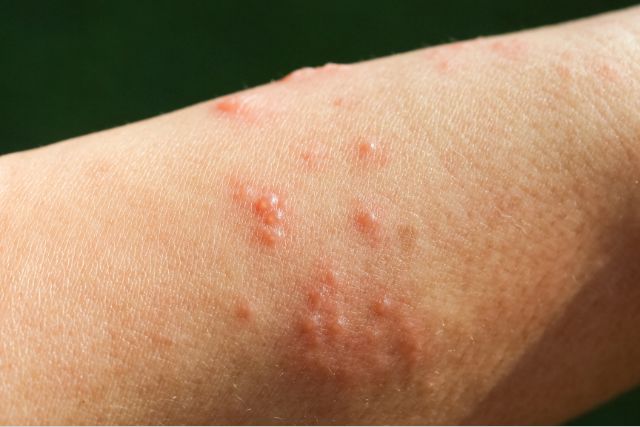

Bullous Diseases
Bullous Diseases: Diagnosis, Challenges & Advances
Join us for an insightful exploration into the world of bullous skin diseases, featuring expert-led presentations and real-world clinical insights.
Why to attend this session:
Enhance diagnostic accuracy, learn about rare and complex cases, get updated on the latest therapeutic approaches, network with fellow dermatologists and experts
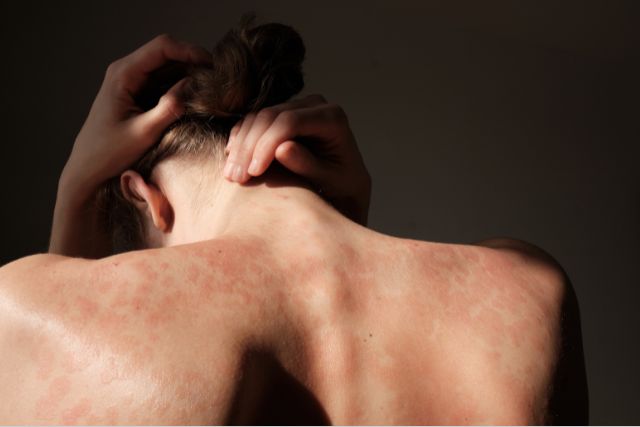

Psoriasis
Recent advances in psoriasis treatment focus on personalized approaches, emphasizing early and aggressive intervention with IL-17/IL-23 inhibitors and novel small molecules to achieve long-term remission, though treatment resistance remains a clinical challenge.
Holistic care, including proactive management of cardiometabolic comorbidities and patient-centered treatment choices, is crucial for optimizing outcomes and reducing systemic inflammation’s long-term impact.
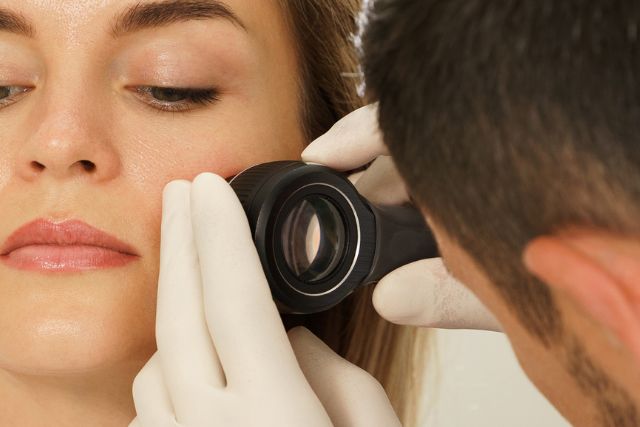

Dermoscopy for non-melanoma skin cancer
Hair and nail dermoscopy highlights the diagnostic value of dermoscopy in identifying inflammatory nail diseases like psoriasis and lichen planus, which show distinct patterns such as pitting, onycholysis, or dorsal pterygium and may require biopsy for confirmation. Dermoscopy is also essential in diagnosing non-melanoma skin cancers like BCC and SCC, as well as rarer malignancies such as adnexal carcinomas and cutaneous lymphomas, by revealing specific vascular and structural features that guide treatment decisions.


Hair disorders: Management
This session explores two challenging types of alopecia: androgenetic alopecia (AGA) and neutrophilic scarring alopecias, including dissecting cellulitis (DC) and folliculitis decalvans (FD). Experts will review the latest in diagnosis, pathophysiology, and personalized treatment strategies, ranging from established therapies to emerging options across pediatric and adult patients.
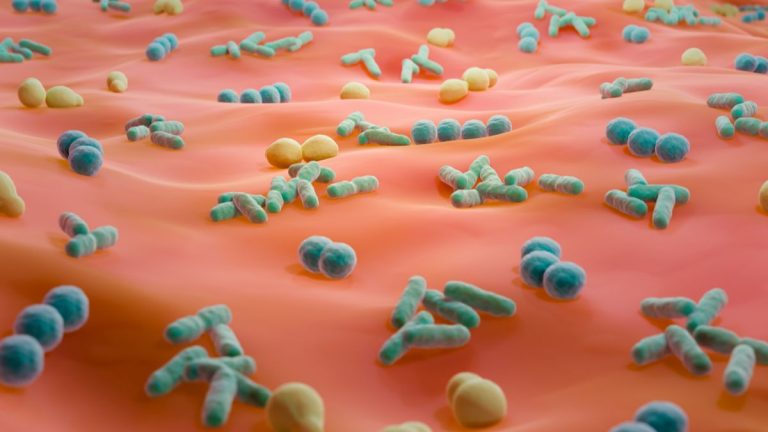

Skin microbiome: its role in acne and hidradenitis suppurativa
In this presentation, we explore how skin microbiome dysbiosis contributes to acne and hidradenitis suppurativa (HS). Acne involves C. acnes phylotype IA1 dominance and S. epidermidis imbalance, while HS is linked to biofilm-related inflammation. We also highlight emerging microbiome-based therapies and personalized skincare approaches.


Nail disorders
This presentation reviews topical, intralesional, systemic, biologic and small molecules treatments, outlining indications based on the site and severity of nail involvement.


Genodermatoses
Skin, hair, and nails reveal systemic diseases. This session covers hair and nail signs in lupus, cancer, and cardiovascular issues. Hair loss patterns may indicate SLE or malignancies, while nail changes like clubbing or Beau’s lines signal systemic illness. Early recognition aids diagnosis and treatment. Another session focuses on nail dystrophy, stressing accurate diagnosis for effective care.


Hair and nail disorders
Skin, hair, and nails reveal systemic diseases. This session covers hair and nail signs in lupus, cancer, and cardiovascular issues. Hair loss patterns may indicate SLE or malignancies, while nail changes like clubbing or Beau’s lines signal systemic illness. Early recognition aids diagnosis and treatment. Another session focuses on nail dystrophy, stressing accurate diagnosis for effective care.
Recently published EADV Podcast


JEADV Podcast – Editor’s Picks February 2026
Join Carle Paul as he presents his selection of Editor’s Picks from the February 2026 issue of the JEADV
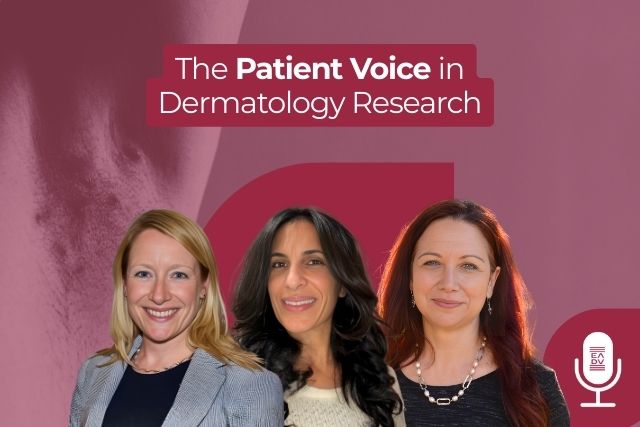

EADV Podcast: The Patient Voice in Dermatology Research
This special episode of the EADV Podcast marks the launch of The Patient Voice, a new section of the Journal of the European Academy of Dermatology and Venereology (JEADV) dedicated to patient-authored contributions.


JEADV Podcast – Editor’s Picks January 2026
Join Carle Paul as he presents his selection of Editor’s Picks from the January 2026 issue of the JEADV


EADV Podcast ep. 152 – Publishing excellence: insights from the EADV Editors-in-Chief
In this episode of the EADV Podcast, Prof. Carle Paul (JEADV Editor -in-Chief) and Prof. Antonio Torrelo (JEADV Clinical Practice Editor-in-Chief) discuss the art and science of editorial decision-making, the balance between evidence and intuition, and the growing role of patient-centred content, from plain-language summaries to patient-authored contributions.
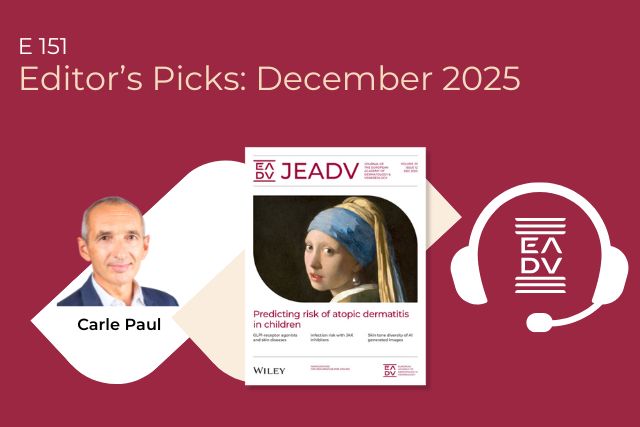

EADV Podcast ep. 151 – Editor’s Picks December 2025
Join Carle Paul as he presents his selection of Editor’s Picks from the December 2025 issue of the JEADV
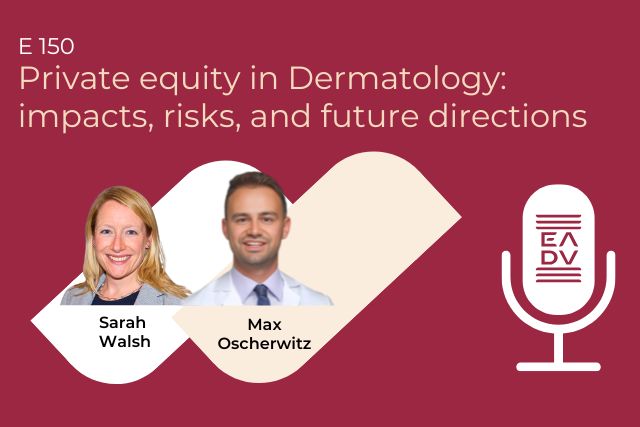

EADV Podcast ep. 150 – Private equity in Dermatology: impacts, risks, and future directions
In this EADV Podcast episode, Dr. Sarah Walsh interviews Dr. Max Oscherwitz about the expanding influence of private equity in dermatology. They explore its rise in U.S. healthcare, why physicians find it appealing, and how financial pressures can affect patient care.


EADV Podcast ep. 149 – Editor’s Picks November 2025
Join Christian Posch as he presents her selection of Editor’s Picks from the November 2025 issue of the JEADV


That Single Patient
Hosted by Dr. Catherine van Montfrans, “That Single Patient” is a thought-provoking podcast exploring the profound impact of empathy, time, and human connection in medicine. Through intimate conversations with clinicians who share unforgettable patient stories – from moments of crisis to long-term care- the series reveals how attentive listening, compassion,


EADV Podcast ep. 148 – Shaping the future of Mohs surgery training in Europe
In this episode of the EADV Podcast, host Dr. Sweta Rai sits down with Prof. Severin Läuchli. Their conversation explores the evolution of Mohs surgery in Europe and the growing need for structured training pathways.
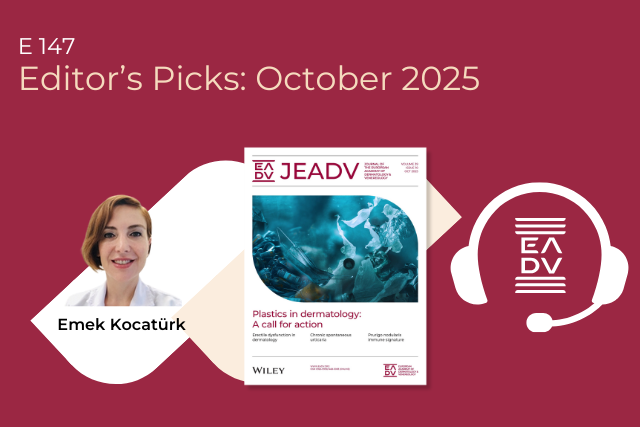

EADV Podcast ep. 147 – Editor’s Picks October 2025
Join Emek Kocatürk as she presents her selection of Editor’s Picks from the October 2025 issue of the JEADV
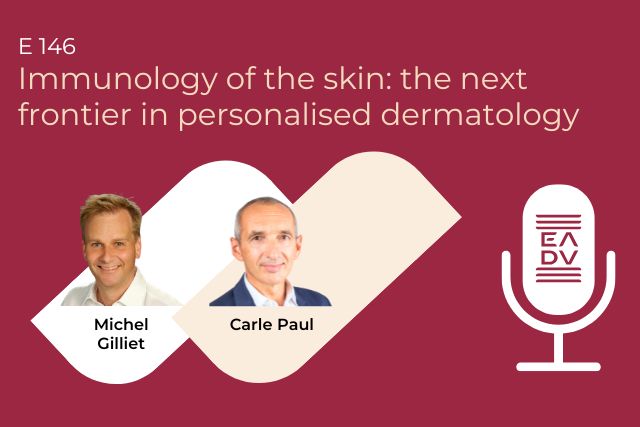

EADV Podcast ep. 146 – Immunology of the skin: the next frontier in personalised dermatology
In this episode of the EADV Podcast, host Prof. Carle Paul welcomes Prof. Michel Gilliet, Professor and Chairman of Dermatology at the University of Lausanne and Chair of the EADV Scientific Programming Committee. Together, they explore groundbreaking advancements in skin immunology, with a particular focus on personalised medicine for immune-mediated
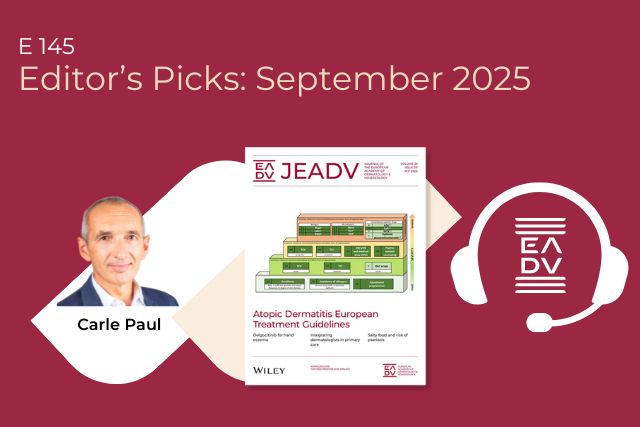

EADV Podcast ep. 145 – Editor’s Picks September 2025
Join Professor Carle Paul presenting his selection of Editor’s Picks from the September 2025 issue of the Journal of the European Academy Dermatology and Venereology.
Recently published EADV Guidelines
-
Messages for ultraviolet-radiation protection to fair-skinned populationsBROCHEZ, Lieve; GARBE, Claus; Forsea, Ana-Maria; AUTIER, Philippe; Boonen, Brigitta; Greinert, Rüdiger; Hoorens, Isabelle; Arenberger, Petr; BERWICK, Marianne; Bylaite, Matilda; del Marmol, Veronique; Dreno, Brigitte; Fargnoli, Maria Concetta; Green, Adele; HAUSCHILD, Axel; HARWOOD, CA; Kandolf, Lidija; KAUFMANN, Roland; Kelleners-Smeets, Nicole; Lallas, Aimilios; Lebbe, Celeste; LEITER, Ulrike; LIM, Henry W.; Longo, Caterina; Malvehy, Josep; Moreno Ramirez, David; Pellacani, Giovanni; Peris, Ketty; Robert, Caroline; Saiag, Philippe; Schadendorf, Dirk; Soyer, Hans Peter; Stockfleth, Eggert; Stratigos, Alexander; Uhara, Hisashi; Vieira, Ricardo; Weinstock, Martin; Whitaker, Dagmar; Whiteman, David; Zalaudek, Iris; Amaral, Teresa; ryll, bettina; astratinei, violeta; Östman, fredrik; spurrier-bernard, gilliosa
Other societies Guidelines November 2025
-
Prevention and Management of Cutaneous Immune-Related Adverse Events: EADV Task Force StatementFattore, Davide; Apalla, Zoe; Freites-Martinez, Azael; Tommasino, Nello; Nikolaou, Vasiliki; Lauletta, Giuseppe; Brugues, Ariadna; Sollena, Pietro; Starace, Michela; Gomes, Nuno; Koumaki, Dimitra; Vigarios, Emmanuelle; Kraehenbuehl, Lukas; Grafanaki, Katerina; Napolitano, Maddalena; sibaud, vincent
EADV Pos. statement October 2025
-
Expert consensus for prevention, diagnosis and management of persistent chemotherapy-induced alopecia Azael Freites-Martinez, Zoe Apalla, Jerry Shapiro, Matilde Iorizzo, Lidia Rudnicka, Kristen Lo Sicco, Vasiliki Nikolaou, Rodrigo Pirmez, Anita Takwale, Davide Fattore, Brittany Dulmage, Bianca Maria Piraccini, Sergio Vano-Galvan, Mario Lacouture, Vincent Sibaud, Michela Valeria Rita Starace
Other Societies Pos. statement September 2025
-
The 2024 European guideline on the management of epididymo-orchitis Edwin D. Justice, John Fricker, Jonathan D. C. Ross, Zsolt Kopa, Mihael Skerlev, Rajul Patel
Other societies Guidelines July 2025
-
Systemic Treatment of Immune Checkpoint Inhibitor Induced Psoriasis: Inference-Based GuidancePapp, Kim; Puig, Lluís; Beecker, Jennifer; Chandran, Vinod; Claveau, Joel; Cortes, Javier; Dutz, Jan; Hornick, Noah; Juergens, Rosalyn; MELOSKY, Barbara; Patel, Anisha; Sauder, Maxwell; Sehdev, Sandeep; sibaud, vincent; Snow, Stephanie
Other societies Pos. statement July 2025
-
European Guideline (EuroGuiDerm) on Atopic Eczema – Living Update 2024 A. Wollenberg, M. Kinberger, B. Arents, N. Aszodi, S. Barbarot, T. Bieber, H. A. Brough, P. Calzavara-Pinton, S. Christen-Zaech, M. Deleuran, M. Dittmann, N. Fosse, K. Gáspár, L. A. A. Gerbens, U. Gieler, G. Girolomoni, S. Gregoriou, S. Holland, C. G. Mortz, A. Nast, U. Nygaard, E. M. Rehbinder, J. Ring, M. Rossi, E. Serra-Baldrich, D. Simon, Z. Z. Szalai, J. C. Szepietowski, A. Torrelo, T. Werfel, R. N. Werner, C. Flohr
Other societies Pos. statement May 2025
-
Management of folliculitis decalvans: the EADV task force on Hair Diseases position statement. Anna Waśkiel-Burnat, Michela Starace, Matilde Iorizzo, Alexandros Katoulis, Zoe Apalla, Leila Asfour, Azael Freites-Martinez, Dimitrios Ioannides, Seyed Morteza Seyed Jafari, Awatef Kelati, Francesca Pampaloni, Bianca Maria Piraccini, Adriana Rakowska, Andrea Sechi, Anita Takwale, Anastasia Therianou, Lidia Rudnicka
EADV Pos. statement April 2025
Recently published EADV Position Statements


Alert on a false health claim: There are no authorised cerebral effects of cosmetics
Press Release from EADV’s Psychodermatology Task Force
Some cosmetic providers claim that the application of their cosmetic products to the skin can have direct effects on the nervous system and brain.
Read the full position statement
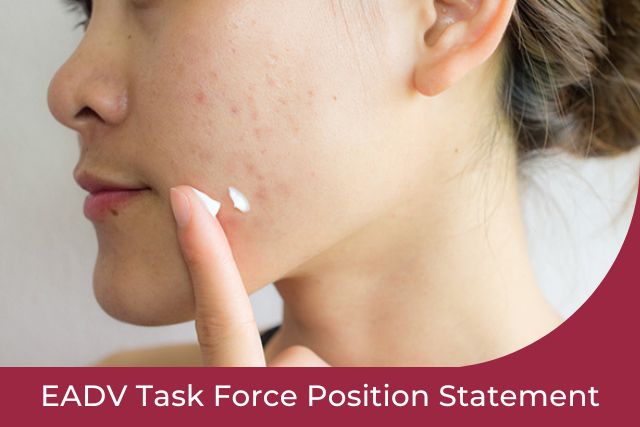

Position statement on latest study regarding benzene in Acne products
Press Release from EADV’s Acne, Rosacea and Hidradenitis Suppurativa Task Force
Benzene, a highly volatile chemical, poses significant health risks, classified as a Group 1 carcinogen by IARC. Exposure occurs through various sources, including industrial emissions, tobacco smoke, and contaminated cosmetics. Recent findings of benzene in anti-acne products raise concerns,
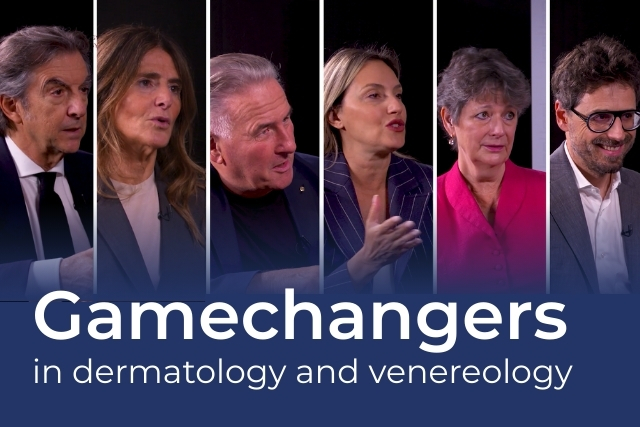

Gamechangers in Dermatology & Venereology
A brand-new interview series spotlighting the minds and breakthroughs redefining our specialty. Each episode takes you beyond the surface, uncovering the innovations, technologies, and global perspectives shaping the next era of dermatology and venereology.

